The Interpretation of Dreams: A Psychological Analysis of Freud's Work
VerifiedAdded on 2021/04/21
|7
|1909
|105
Essay
AI Summary
This essay provides a comprehensive analysis of Sigmund Freud's seminal work, 'The Interpretation of Dreams.' It delves into Freud's exploration of the unconscious mind and its relation to dreams, emphasizing the concept of dreams as 'the royal road to the unconscious.' The essay examines the core concepts of the book, including wish fulfillment, manifest and latent content of dreams, and the Oedipus complex. It highlights Freud's revolutionary ideas and their lasting impact on psychology, psychoanalysis, and related fields, while also acknowledging critiques regarding his methodology and lack of scientific rigor. The essay underscores the importance of Freud's work as a cornerstone for understanding the unconscious and dream interpretation, and its influence on the development of Freudian psychology and related fields. The author reflects on the book's contribution to understanding consciousness and dream machinery, and its relevance for psychology students.
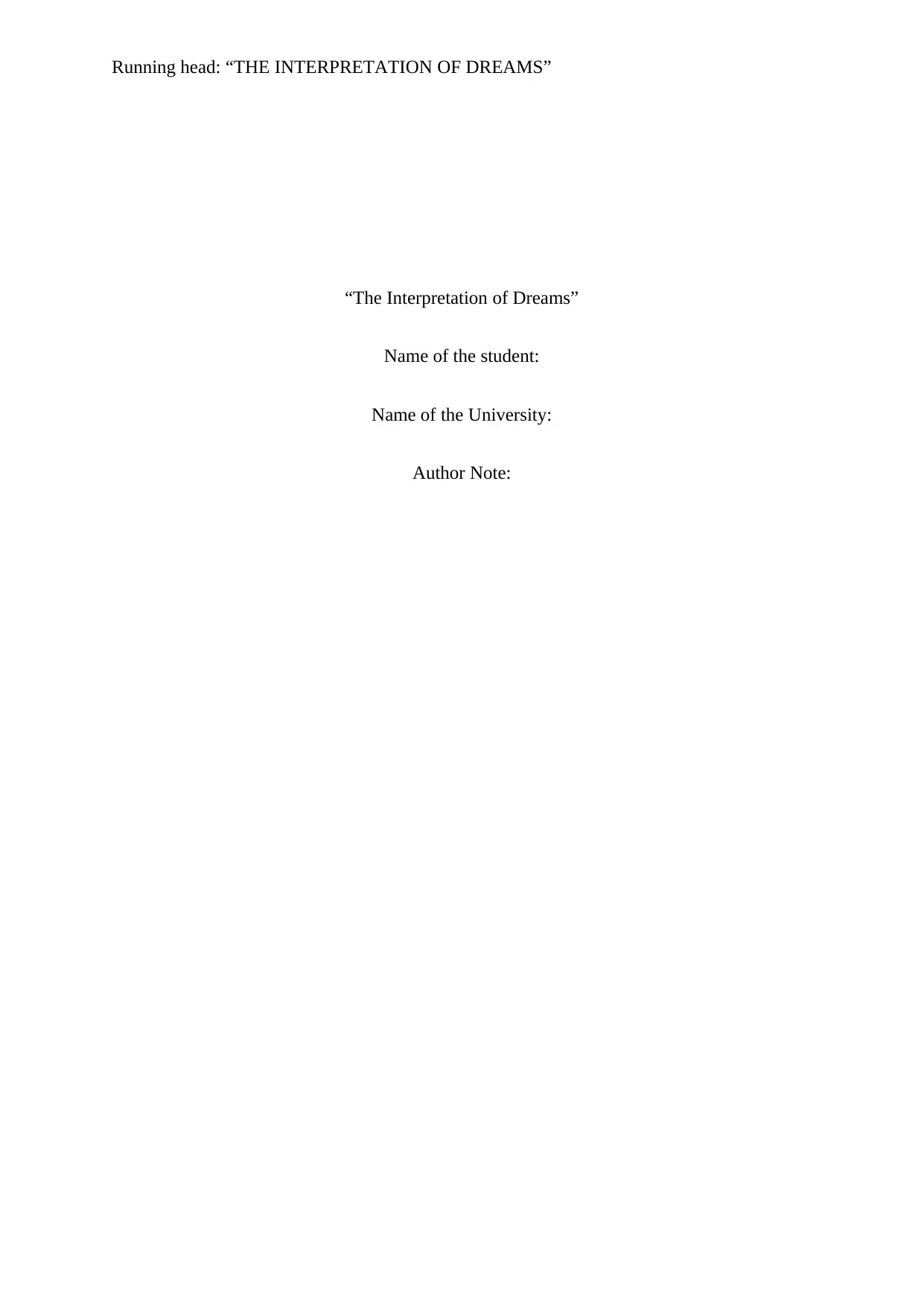
Running head: “THE INTERPRETATION OF DREAMS”
“The Interpretation of Dreams”
Name of the student:
Name of the University:
Author Note:
“The Interpretation of Dreams”
Name of the student:
Name of the University:
Author Note:
Paraphrase This Document
Need a fresh take? Get an instant paraphrase of this document with our AI Paraphraser
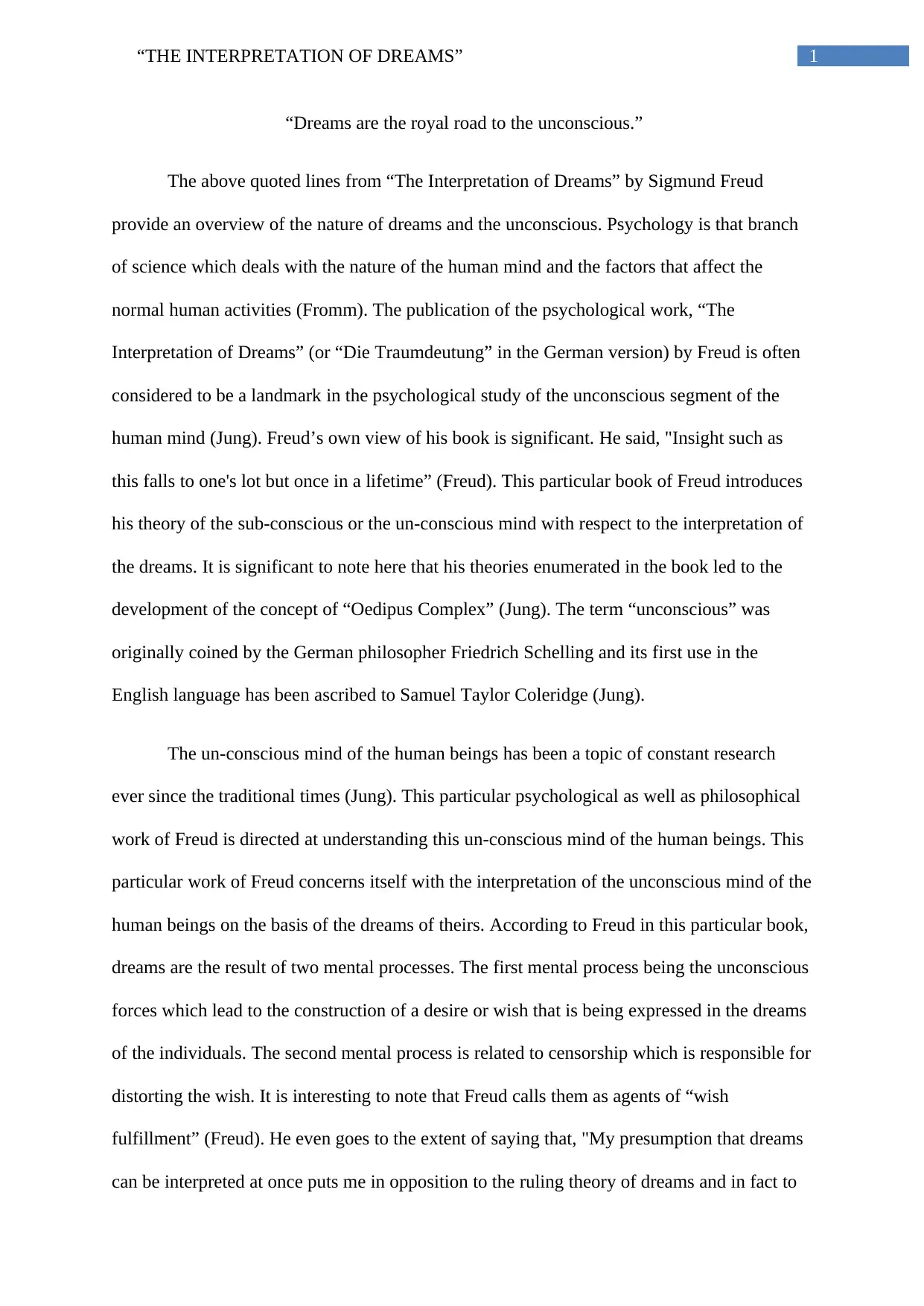
1“THE INTERPRETATION OF DREAMS”
“Dreams are the royal road to the unconscious.”
The above quoted lines from “The Interpretation of Dreams” by Sigmund Freud
provide an overview of the nature of dreams and the unconscious. Psychology is that branch
of science which deals with the nature of the human mind and the factors that affect the
normal human activities (Fromm). The publication of the psychological work, “The
Interpretation of Dreams” (or “Die Traumdeutung” in the German version) by Freud is often
considered to be a landmark in the psychological study of the unconscious segment of the
human mind (Jung). Freud’s own view of his book is significant. He said, "Insight such as
this falls to one's lot but once in a lifetime” (Freud). This particular book of Freud introduces
his theory of the sub-conscious or the un-conscious mind with respect to the interpretation of
the dreams. It is significant to note here that his theories enumerated in the book led to the
development of the concept of “Oedipus Complex” (Jung). The term “unconscious” was
originally coined by the German philosopher Friedrich Schelling and its first use in the
English language has been ascribed to Samuel Taylor Coleridge (Jung).
The un-conscious mind of the human beings has been a topic of constant research
ever since the traditional times (Jung). This particular psychological as well as philosophical
work of Freud is directed at understanding this un-conscious mind of the human beings. This
particular work of Freud concerns itself with the interpretation of the unconscious mind of the
human beings on the basis of the dreams of theirs. According to Freud in this particular book,
dreams are the result of two mental processes. The first mental process being the unconscious
forces which lead to the construction of a desire or wish that is being expressed in the dreams
of the individuals. The second mental process is related to censorship which is responsible for
distorting the wish. It is interesting to note that Freud calls them as agents of “wish
fulfillment” (Freud). He even goes to the extent of saying that, "My presumption that dreams
can be interpreted at once puts me in opposition to the ruling theory of dreams and in fact to
“Dreams are the royal road to the unconscious.”
The above quoted lines from “The Interpretation of Dreams” by Sigmund Freud
provide an overview of the nature of dreams and the unconscious. Psychology is that branch
of science which deals with the nature of the human mind and the factors that affect the
normal human activities (Fromm). The publication of the psychological work, “The
Interpretation of Dreams” (or “Die Traumdeutung” in the German version) by Freud is often
considered to be a landmark in the psychological study of the unconscious segment of the
human mind (Jung). Freud’s own view of his book is significant. He said, "Insight such as
this falls to one's lot but once in a lifetime” (Freud). This particular book of Freud introduces
his theory of the sub-conscious or the un-conscious mind with respect to the interpretation of
the dreams. It is significant to note here that his theories enumerated in the book led to the
development of the concept of “Oedipus Complex” (Jung). The term “unconscious” was
originally coined by the German philosopher Friedrich Schelling and its first use in the
English language has been ascribed to Samuel Taylor Coleridge (Jung).
The un-conscious mind of the human beings has been a topic of constant research
ever since the traditional times (Jung). This particular psychological as well as philosophical
work of Freud is directed at understanding this un-conscious mind of the human beings. This
particular work of Freud concerns itself with the interpretation of the unconscious mind of the
human beings on the basis of the dreams of theirs. According to Freud in this particular book,
dreams are the result of two mental processes. The first mental process being the unconscious
forces which lead to the construction of a desire or wish that is being expressed in the dreams
of the individuals. The second mental process is related to censorship which is responsible for
distorting the wish. It is interesting to note that Freud calls them as agents of “wish
fulfillment” (Freud). He even goes to the extent of saying that, "My presumption that dreams
can be interpreted at once puts me in opposition to the ruling theory of dreams and in fact to
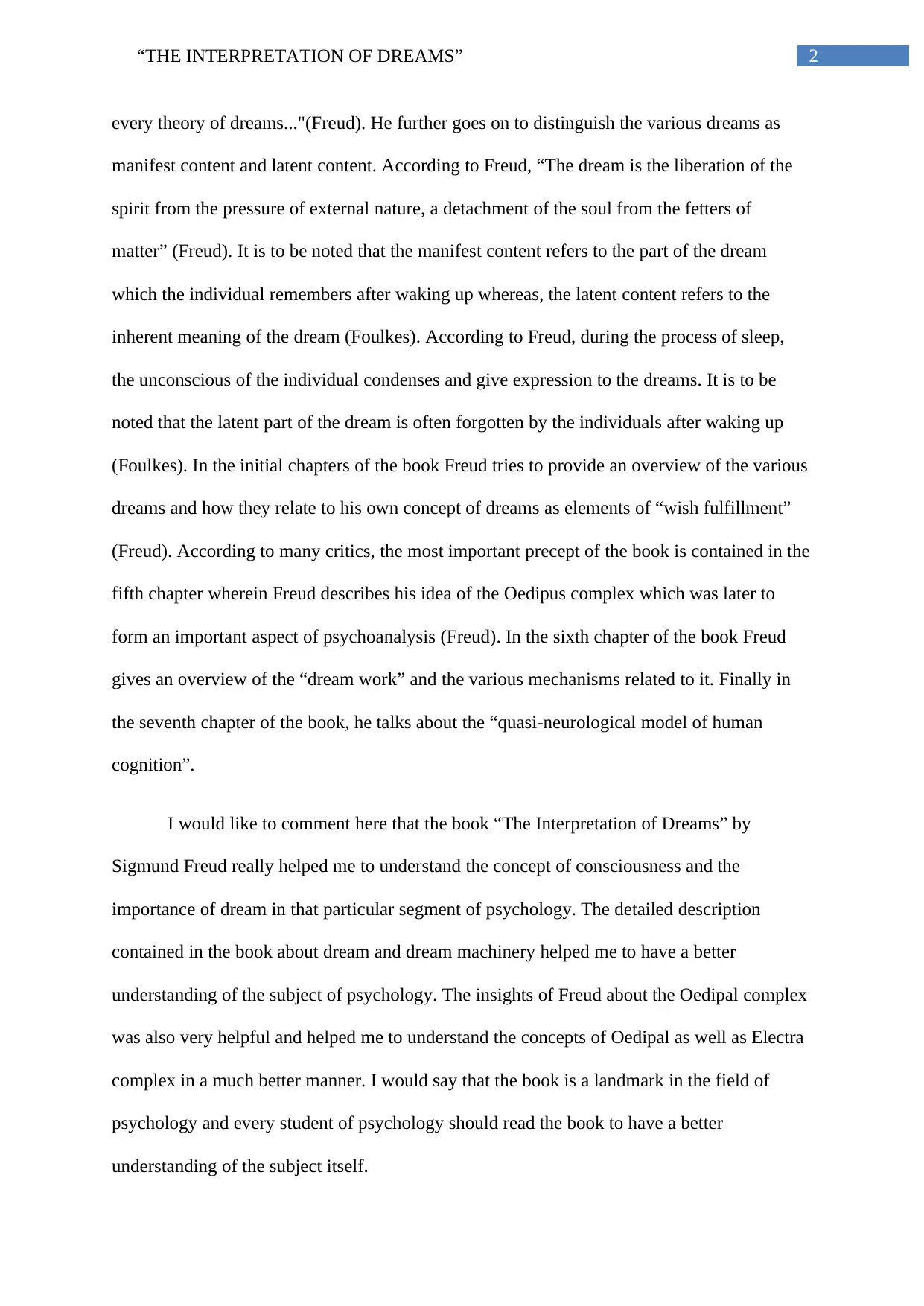
2“THE INTERPRETATION OF DREAMS”
every theory of dreams..."(Freud). He further goes on to distinguish the various dreams as
manifest content and latent content. According to Freud, “The dream is the liberation of the
spirit from the pressure of external nature, a detachment of the soul from the fetters of
matter” (Freud). It is to be noted that the manifest content refers to the part of the dream
which the individual remembers after waking up whereas, the latent content refers to the
inherent meaning of the dream (Foulkes). According to Freud, during the process of sleep,
the unconscious of the individual condenses and give expression to the dreams. It is to be
noted that the latent part of the dream is often forgotten by the individuals after waking up
(Foulkes). In the initial chapters of the book Freud tries to provide an overview of the various
dreams and how they relate to his own concept of dreams as elements of “wish fulfillment”
(Freud). According to many critics, the most important precept of the book is contained in the
fifth chapter wherein Freud describes his idea of the Oedipus complex which was later to
form an important aspect of psychoanalysis (Freud). In the sixth chapter of the book Freud
gives an overview of the “dream work” and the various mechanisms related to it. Finally in
the seventh chapter of the book, he talks about the “quasi-neurological model of human
cognition”.
I would like to comment here that the book “The Interpretation of Dreams” by
Sigmund Freud really helped me to understand the concept of consciousness and the
importance of dream in that particular segment of psychology. The detailed description
contained in the book about dream and dream machinery helped me to have a better
understanding of the subject of psychology. The insights of Freud about the Oedipal complex
was also very helpful and helped me to understand the concepts of Oedipal as well as Electra
complex in a much better manner. I would say that the book is a landmark in the field of
psychology and every student of psychology should read the book to have a better
understanding of the subject itself.
every theory of dreams..."(Freud). He further goes on to distinguish the various dreams as
manifest content and latent content. According to Freud, “The dream is the liberation of the
spirit from the pressure of external nature, a detachment of the soul from the fetters of
matter” (Freud). It is to be noted that the manifest content refers to the part of the dream
which the individual remembers after waking up whereas, the latent content refers to the
inherent meaning of the dream (Foulkes). According to Freud, during the process of sleep,
the unconscious of the individual condenses and give expression to the dreams. It is to be
noted that the latent part of the dream is often forgotten by the individuals after waking up
(Foulkes). In the initial chapters of the book Freud tries to provide an overview of the various
dreams and how they relate to his own concept of dreams as elements of “wish fulfillment”
(Freud). According to many critics, the most important precept of the book is contained in the
fifth chapter wherein Freud describes his idea of the Oedipus complex which was later to
form an important aspect of psychoanalysis (Freud). In the sixth chapter of the book Freud
gives an overview of the “dream work” and the various mechanisms related to it. Finally in
the seventh chapter of the book, he talks about the “quasi-neurological model of human
cognition”.
I would like to comment here that the book “The Interpretation of Dreams” by
Sigmund Freud really helped me to understand the concept of consciousness and the
importance of dream in that particular segment of psychology. The detailed description
contained in the book about dream and dream machinery helped me to have a better
understanding of the subject of psychology. The insights of Freud about the Oedipal complex
was also very helpful and helped me to understand the concepts of Oedipal as well as Electra
complex in a much better manner. I would say that the book is a landmark in the field of
psychology and every student of psychology should read the book to have a better
understanding of the subject itself.
⊘ This is a preview!⊘
Do you want full access?
Subscribe today to unlock all pages.

Trusted by 1+ million students worldwide
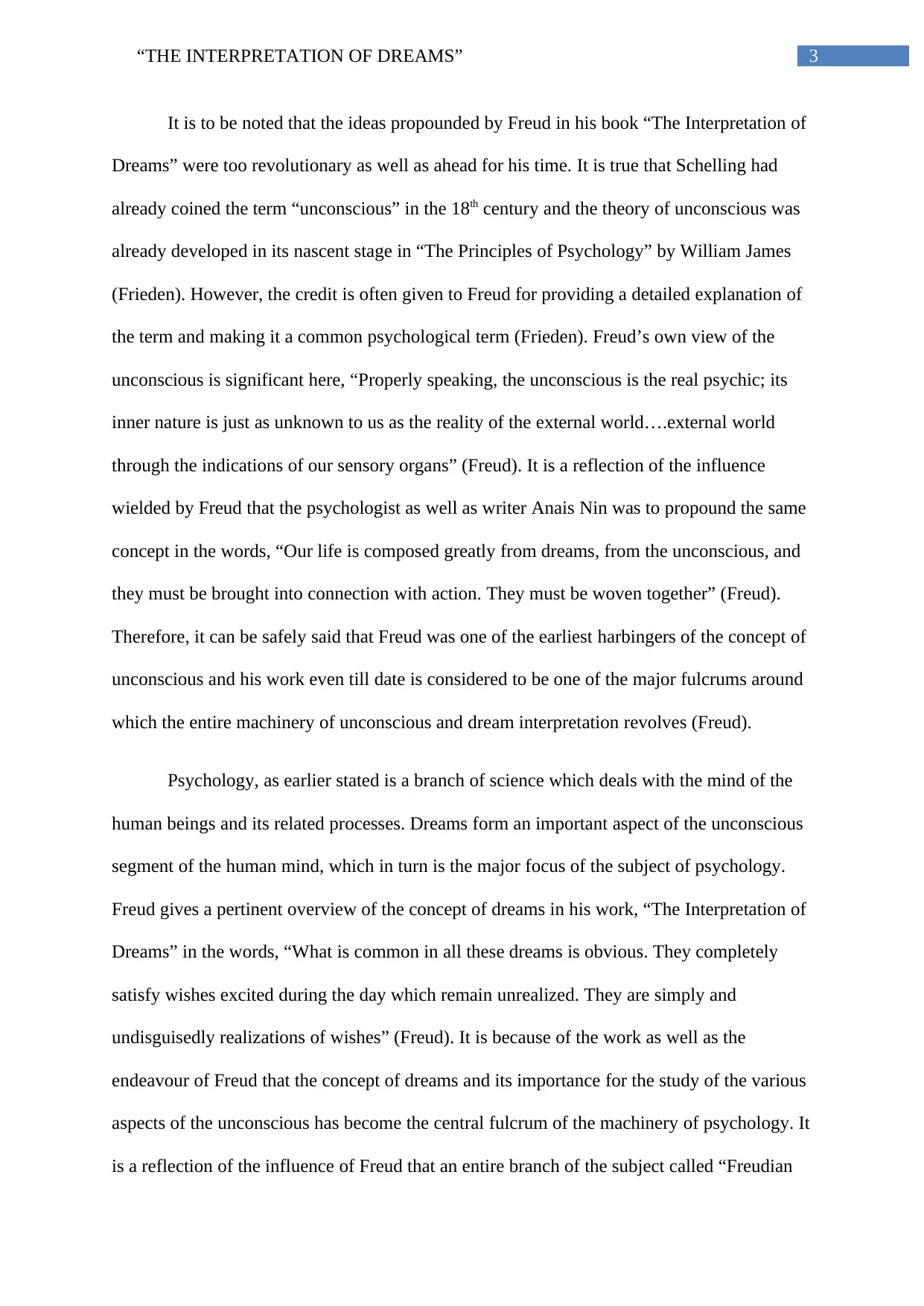
3“THE INTERPRETATION OF DREAMS”
It is to be noted that the ideas propounded by Freud in his book “The Interpretation of
Dreams” were too revolutionary as well as ahead for his time. It is true that Schelling had
already coined the term “unconscious” in the 18th century and the theory of unconscious was
already developed in its nascent stage in “The Principles of Psychology” by William James
(Frieden). However, the credit is often given to Freud for providing a detailed explanation of
the term and making it a common psychological term (Frieden). Freud’s own view of the
unconscious is significant here, “Properly speaking, the unconscious is the real psychic; its
inner nature is just as unknown to us as the reality of the external world….external world
through the indications of our sensory organs” (Freud). It is a reflection of the influence
wielded by Freud that the psychologist as well as writer Anais Nin was to propound the same
concept in the words, “Our life is composed greatly from dreams, from the unconscious, and
they must be brought into connection with action. They must be woven together” (Freud).
Therefore, it can be safely said that Freud was one of the earliest harbingers of the concept of
unconscious and his work even till date is considered to be one of the major fulcrums around
which the entire machinery of unconscious and dream interpretation revolves (Freud).
Psychology, as earlier stated is a branch of science which deals with the mind of the
human beings and its related processes. Dreams form an important aspect of the unconscious
segment of the human mind, which in turn is the major focus of the subject of psychology.
Freud gives a pertinent overview of the concept of dreams in his work, “The Interpretation of
Dreams” in the words, “What is common in all these dreams is obvious. They completely
satisfy wishes excited during the day which remain unrealized. They are simply and
undisguisedly realizations of wishes” (Freud). It is because of the work as well as the
endeavour of Freud that the concept of dreams and its importance for the study of the various
aspects of the unconscious has become the central fulcrum of the machinery of psychology. It
is a reflection of the influence of Freud that an entire branch of the subject called “Freudian
It is to be noted that the ideas propounded by Freud in his book “The Interpretation of
Dreams” were too revolutionary as well as ahead for his time. It is true that Schelling had
already coined the term “unconscious” in the 18th century and the theory of unconscious was
already developed in its nascent stage in “The Principles of Psychology” by William James
(Frieden). However, the credit is often given to Freud for providing a detailed explanation of
the term and making it a common psychological term (Frieden). Freud’s own view of the
unconscious is significant here, “Properly speaking, the unconscious is the real psychic; its
inner nature is just as unknown to us as the reality of the external world….external world
through the indications of our sensory organs” (Freud). It is a reflection of the influence
wielded by Freud that the psychologist as well as writer Anais Nin was to propound the same
concept in the words, “Our life is composed greatly from dreams, from the unconscious, and
they must be brought into connection with action. They must be woven together” (Freud).
Therefore, it can be safely said that Freud was one of the earliest harbingers of the concept of
unconscious and his work even till date is considered to be one of the major fulcrums around
which the entire machinery of unconscious and dream interpretation revolves (Freud).
Psychology, as earlier stated is a branch of science which deals with the mind of the
human beings and its related processes. Dreams form an important aspect of the unconscious
segment of the human mind, which in turn is the major focus of the subject of psychology.
Freud gives a pertinent overview of the concept of dreams in his work, “The Interpretation of
Dreams” in the words, “What is common in all these dreams is obvious. They completely
satisfy wishes excited during the day which remain unrealized. They are simply and
undisguisedly realizations of wishes” (Freud). It is because of the work as well as the
endeavour of Freud that the concept of dreams and its importance for the study of the various
aspects of the unconscious has become the central fulcrum of the machinery of psychology. It
is a reflection of the influence of Freud that an entire branch of the subject called “Freudian
Paraphrase This Document
Need a fresh take? Get an instant paraphrase of this document with our AI Paraphraser
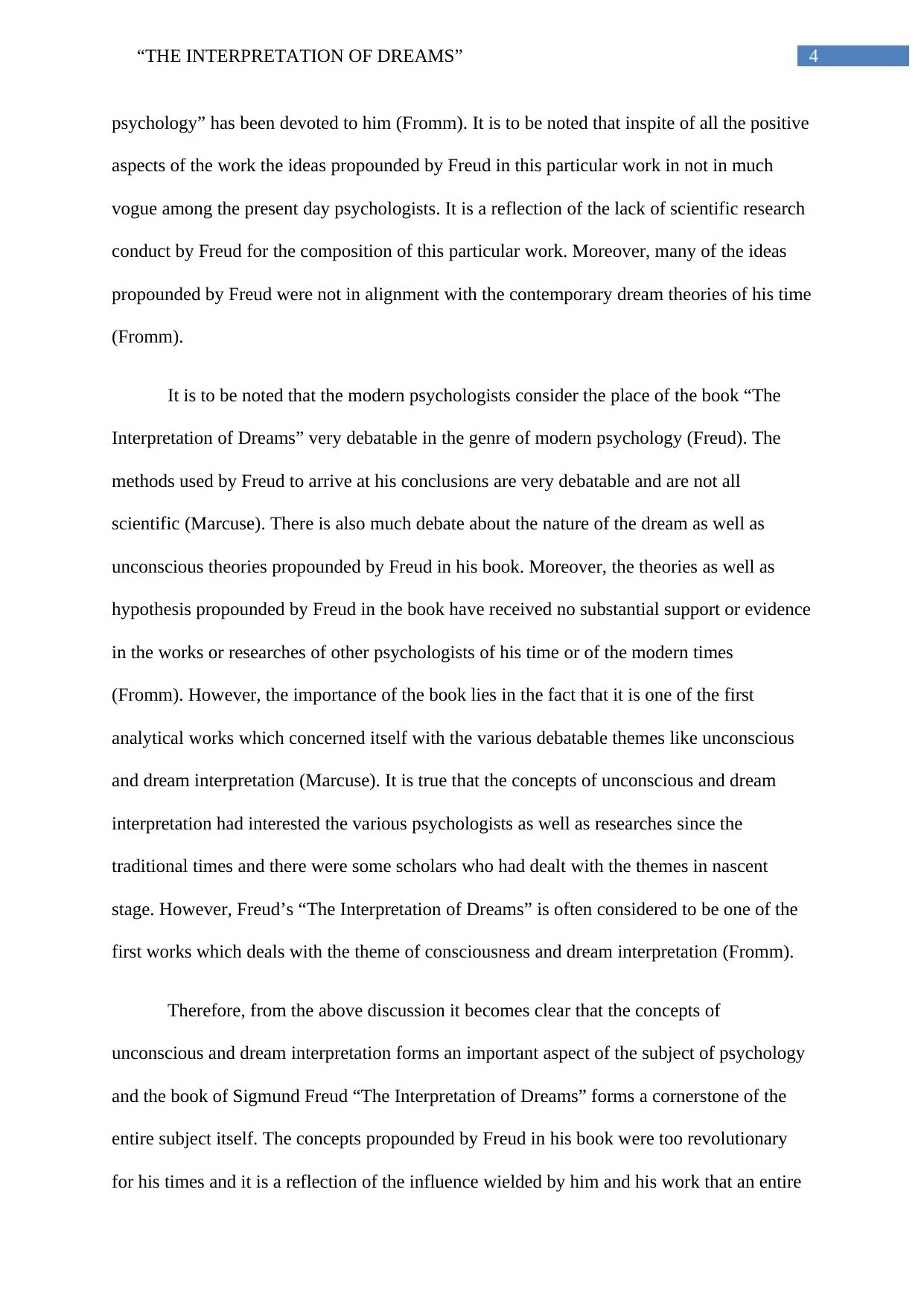
4“THE INTERPRETATION OF DREAMS”
psychology” has been devoted to him (Fromm). It is to be noted that inspite of all the positive
aspects of the work the ideas propounded by Freud in this particular work in not in much
vogue among the present day psychologists. It is a reflection of the lack of scientific research
conduct by Freud for the composition of this particular work. Moreover, many of the ideas
propounded by Freud were not in alignment with the contemporary dream theories of his time
(Fromm).
It is to be noted that the modern psychologists consider the place of the book “The
Interpretation of Dreams” very debatable in the genre of modern psychology (Freud). The
methods used by Freud to arrive at his conclusions are very debatable and are not all
scientific (Marcuse). There is also much debate about the nature of the dream as well as
unconscious theories propounded by Freud in his book. Moreover, the theories as well as
hypothesis propounded by Freud in the book have received no substantial support or evidence
in the works or researches of other psychologists of his time or of the modern times
(Fromm). However, the importance of the book lies in the fact that it is one of the first
analytical works which concerned itself with the various debatable themes like unconscious
and dream interpretation (Marcuse). It is true that the concepts of unconscious and dream
interpretation had interested the various psychologists as well as researches since the
traditional times and there were some scholars who had dealt with the themes in nascent
stage. However, Freud’s “The Interpretation of Dreams” is often considered to be one of the
first works which deals with the theme of consciousness and dream interpretation (Fromm).
Therefore, from the above discussion it becomes clear that the concepts of
unconscious and dream interpretation forms an important aspect of the subject of psychology
and the book of Sigmund Freud “The Interpretation of Dreams” forms a cornerstone of the
entire subject itself. The concepts propounded by Freud in his book were too revolutionary
for his times and it is a reflection of the influence wielded by him and his work that an entire
psychology” has been devoted to him (Fromm). It is to be noted that inspite of all the positive
aspects of the work the ideas propounded by Freud in this particular work in not in much
vogue among the present day psychologists. It is a reflection of the lack of scientific research
conduct by Freud for the composition of this particular work. Moreover, many of the ideas
propounded by Freud were not in alignment with the contemporary dream theories of his time
(Fromm).
It is to be noted that the modern psychologists consider the place of the book “The
Interpretation of Dreams” very debatable in the genre of modern psychology (Freud). The
methods used by Freud to arrive at his conclusions are very debatable and are not all
scientific (Marcuse). There is also much debate about the nature of the dream as well as
unconscious theories propounded by Freud in his book. Moreover, the theories as well as
hypothesis propounded by Freud in the book have received no substantial support or evidence
in the works or researches of other psychologists of his time or of the modern times
(Fromm). However, the importance of the book lies in the fact that it is one of the first
analytical works which concerned itself with the various debatable themes like unconscious
and dream interpretation (Marcuse). It is true that the concepts of unconscious and dream
interpretation had interested the various psychologists as well as researches since the
traditional times and there were some scholars who had dealt with the themes in nascent
stage. However, Freud’s “The Interpretation of Dreams” is often considered to be one of the
first works which deals with the theme of consciousness and dream interpretation (Fromm).
Therefore, from the above discussion it becomes clear that the concepts of
unconscious and dream interpretation forms an important aspect of the subject of psychology
and the book of Sigmund Freud “The Interpretation of Dreams” forms a cornerstone of the
entire subject itself. The concepts propounded by Freud in his book were too revolutionary
for his times and it is a reflection of the influence wielded by him and his work that an entire
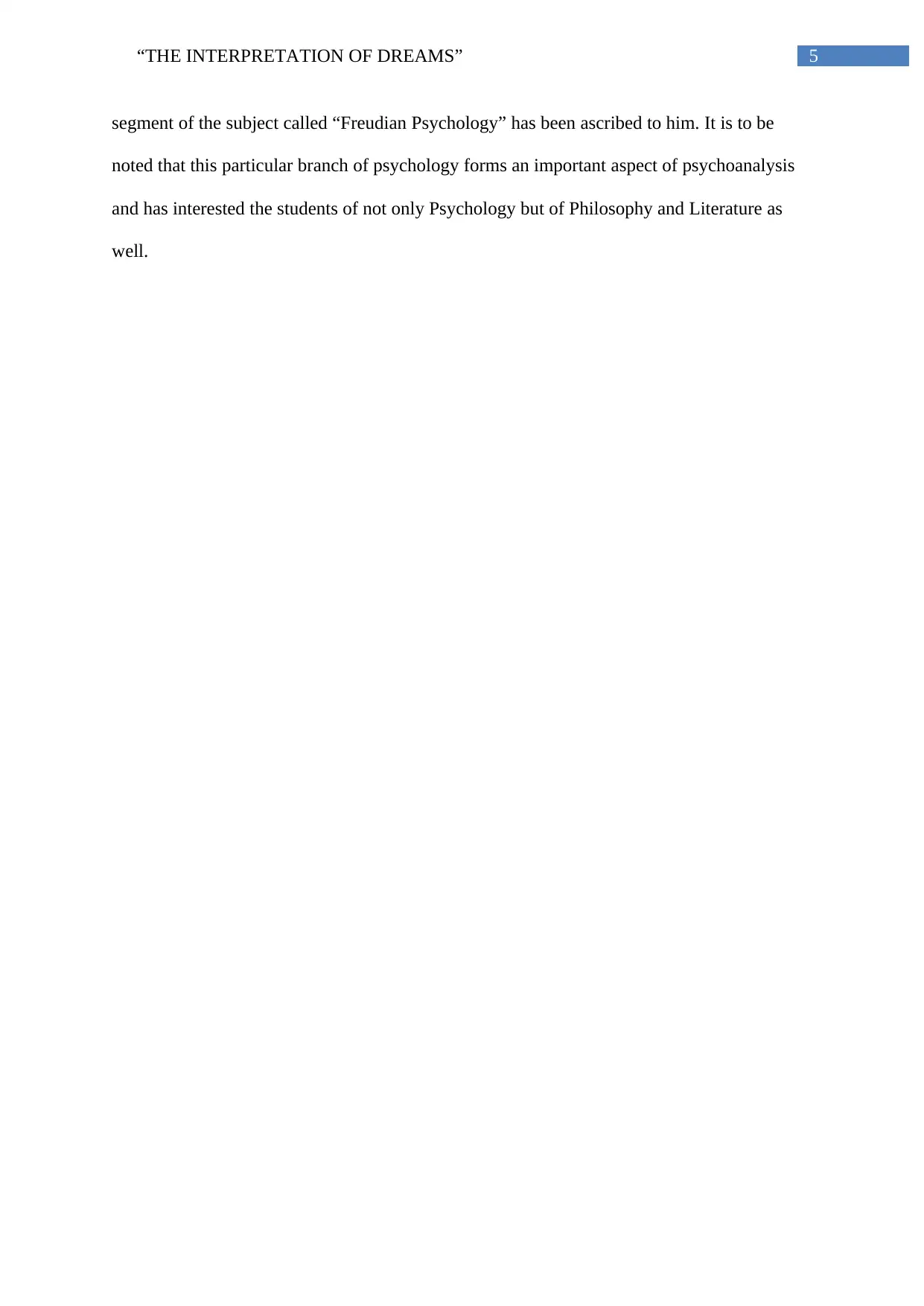
5“THE INTERPRETATION OF DREAMS”
segment of the subject called “Freudian Psychology” has been ascribed to him. It is to be
noted that this particular branch of psychology forms an important aspect of psychoanalysis
and has interested the students of not only Psychology but of Philosophy and Literature as
well.
segment of the subject called “Freudian Psychology” has been ascribed to him. It is to be
noted that this particular branch of psychology forms an important aspect of psychoanalysis
and has interested the students of not only Psychology but of Philosophy and Literature as
well.
⊘ This is a preview!⊘
Do you want full access?
Subscribe today to unlock all pages.

Trusted by 1+ million students worldwide
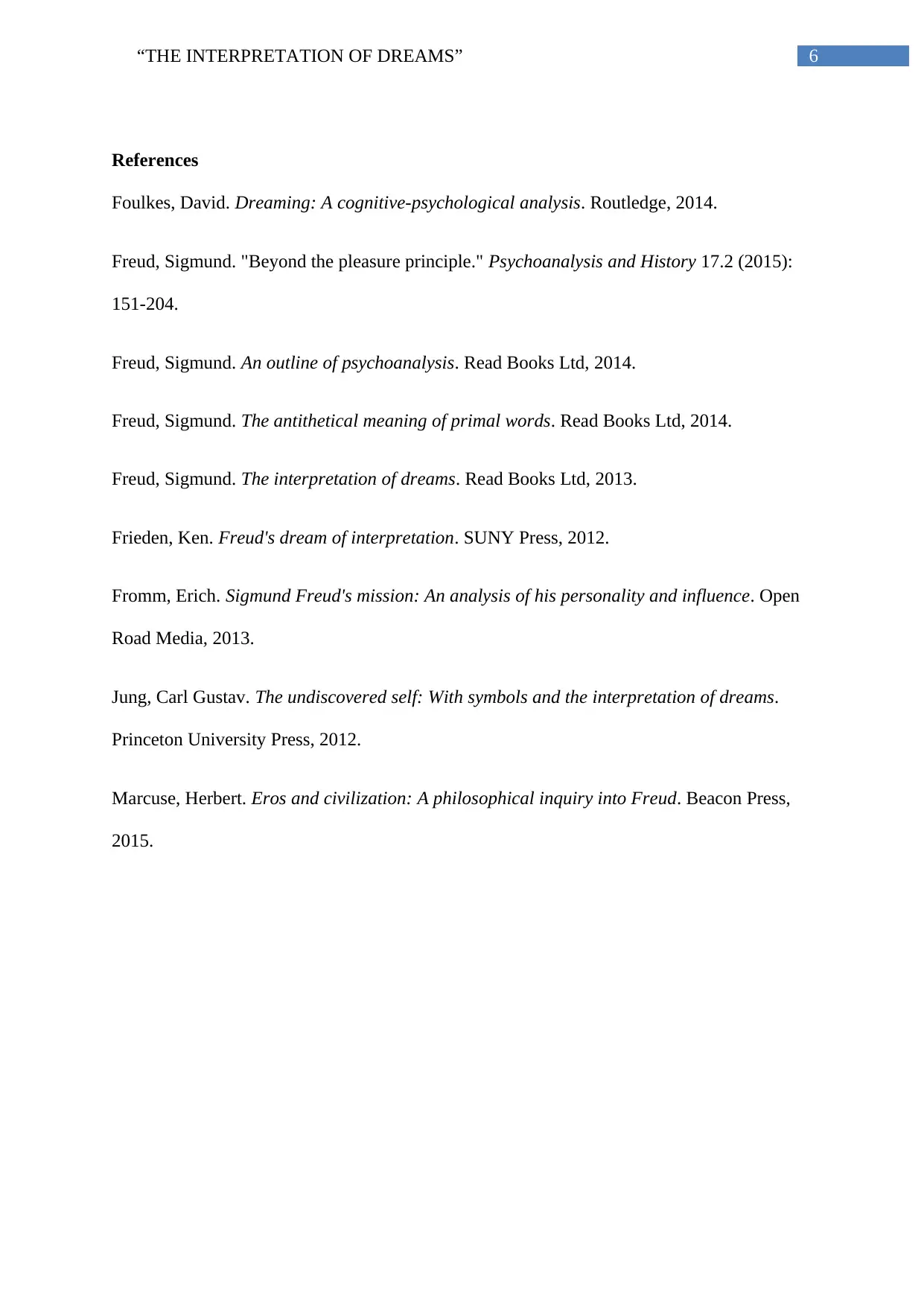
6“THE INTERPRETATION OF DREAMS”
References
Foulkes, David. Dreaming: A cognitive-psychological analysis. Routledge, 2014.
Freud, Sigmund. "Beyond the pleasure principle." Psychoanalysis and History 17.2 (2015):
151-204.
Freud, Sigmund. An outline of psychoanalysis. Read Books Ltd, 2014.
Freud, Sigmund. The antithetical meaning of primal words. Read Books Ltd, 2014.
Freud, Sigmund. The interpretation of dreams. Read Books Ltd, 2013.
Frieden, Ken. Freud's dream of interpretation. SUNY Press, 2012.
Fromm, Erich. Sigmund Freud's mission: An analysis of his personality and influence. Open
Road Media, 2013.
Jung, Carl Gustav. The undiscovered self: With symbols and the interpretation of dreams.
Princeton University Press, 2012.
Marcuse, Herbert. Eros and civilization: A philosophical inquiry into Freud. Beacon Press,
2015.
References
Foulkes, David. Dreaming: A cognitive-psychological analysis. Routledge, 2014.
Freud, Sigmund. "Beyond the pleasure principle." Psychoanalysis and History 17.2 (2015):
151-204.
Freud, Sigmund. An outline of psychoanalysis. Read Books Ltd, 2014.
Freud, Sigmund. The antithetical meaning of primal words. Read Books Ltd, 2014.
Freud, Sigmund. The interpretation of dreams. Read Books Ltd, 2013.
Frieden, Ken. Freud's dream of interpretation. SUNY Press, 2012.
Fromm, Erich. Sigmund Freud's mission: An analysis of his personality and influence. Open
Road Media, 2013.
Jung, Carl Gustav. The undiscovered self: With symbols and the interpretation of dreams.
Princeton University Press, 2012.
Marcuse, Herbert. Eros and civilization: A philosophical inquiry into Freud. Beacon Press,
2015.
1 out of 7
Related Documents
Your All-in-One AI-Powered Toolkit for Academic Success.
+13062052269
info@desklib.com
Available 24*7 on WhatsApp / Email
![[object Object]](/_next/static/media/star-bottom.7253800d.svg)
Unlock your academic potential
Copyright © 2020–2026 A2Z Services. All Rights Reserved. Developed and managed by ZUCOL.





